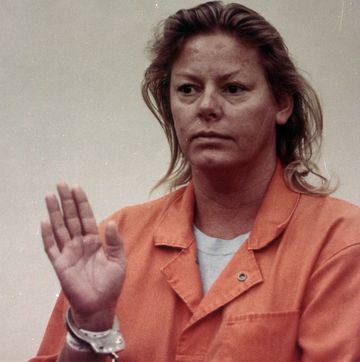When infants started dying at England’s Countess of Chester Hospital in June 2015, neonatal nurse Lucy Letby was suspected from the start.
Despite concerns raised by staff members, Letby continued to work at the hospital, targeting 17 newborns in her care within the span of a year. Following the suspicious deaths of two triplets, she was finally removed from her duties but remained in an administrative role until her arrest in July 2018.
Letby, whose crimes are explored in Netflix’s new documentary, The Investigation of Lucy Letby, was eventually convicted of murdering seven babies and attempting to murder seven others. Now serving 15 life sentences with no possibility for parole, the 36-year-old is considered one of Britain’s most prolific serial killers.
But sadly, her case is far from unique. In fact, it bears a striking resemblance to the murders by another infamous pediatric nurse: Beverley Allitt.
Who Is Beverley Allitt?
Dubbed the “Angel of Death,” Beverley Allitt killed four young kids and infants and attacked nine others between February and April 1991 at Grantham and Kesteven Hospital in Lincolnshire, England.
With access to an array of medical supplies, Allitt injured and murdered her victims by injecting them with air bubbles, potassium, insulin, and other dangerous substances. She also cut off her victims’ oxygen by smothering them or by tampering with machines.
Her first victim, 7-month-old Liam Taylor, had a chest infection when he was admitted to the hospital. Allitt was alone with him when he suffered two unexpected respiratory crises and later went into cardiac arrest, which resulted in severe brain damage. At the advice of his doctors, the boy’s parents made the difficult decision to remove him from life support, and he subsequently died of heart failure.
Two weeks later, Allitt struck again, this time targeting Timothy Hardwick, an 11-year-old boy with cerebral palsy. Just three hours after being admitted, he was found without a pulse. Once again, the nurse summoned the emergency resuscitation team, but they were unable to revive him. Allitt continued her spree of violence unchecked, attacking several other children, most of whom only escaped her wrath by being transferred to another hospital.
That April, she targeted two-month-old twins Katie and Becky Philips, who were born prematurely. After suffering a bout of the stomach flu, Becky came under the killer nurse’s care. Allitt claimed the baby was hypoglycemic—despite no evidence. Becky was soon discharged, but died in her home later that night.
How Was Beverley Allitt Caught?
It wasn’t until after the death of her 13th and final victim, 15-month-old Claire Peck, that Allitt was finally suspected. She was only with Peck for a few minutes when the asthmatic infant had a heart attack. While she survived the initial incident, the child suffered a second attack that proved to be fatal. It was then that hospital staff started putting the pieces together, triggering an investigation.
Upon searching Allitt’s home, police found missing nursing logs, which linked her to the attacks against all 13 victims, as well as the missing keys to the insulin fridge. In November 1991, Allitt was arrested and charged with murder, attempted murder, and grievous bodily harm.
Where Is Beverly Allitt Now?
During her trial, a pediatric expert claimed that her behavior was akin to someone with Munchausen syndrome by Proxy (now known as Factitious disorder imposed on another), a form of abuse where a caregiver fabricates, exaggerates, or induces physical or psychological symptoms in a person under their care. However, she never fully explained her motives and pleaded not guilty to the charges.
Despite maintaining her innocence, Allitt was convicted on all counts in May 1993, and sentenced to 13 concurrent life sentences. A week into her sentence, she refused to eat and drink and was transferred to Rampton Secure Hospital, a psychiatric facility, where the 57-year-old remains detained. In 2023, she asked to be transferred to a regular prison, but her request was denied.
Is Lucy Letby a Copycat Killer?
Although their crimes were committed 24 years apart, Letby has been repeatedly compared to Allitt. While it’s unclear if Letby was actually inspired by Allitt, both women used similar methods to commit their murders, and their motives remain unclear in both cases.
Stuart Clifton, the retired detective who helped bring Allitt to justice, went so far as to call Letby a “copycat murderer,” suggesting to ITV News in August 2023 that she might have been inspired by Allitt’s crimes, and saying of Letby’s murders: “It’s almost like she read the Allitt book.”
Similar to Allitt, Letby used various methods to kill her victims, including deliberately injecting them with air bubbles and poisoning them with insulin. She also assaulted them with medical tools and force-fed them milk until they died. During her trial, prosecutors suggested several possible motives for Letby’s murders during her trial, including that she enjoyed “playing God” and got bored of caring for healthier infants.
While Letby wrote on Post-it notes, “I killed them because I’m not good enough to care for them,” and “I AM EVIL I DID THIS,” her attorneys claimed that was neither a motive nor a confession, but rather the result of mental anguish caused by the allegations against her.
How to Watch The Investigation of Lucy Letby on Netflix
Letby’s motives are further examined in the new documentary The Investigation of Lucy Letby, which is now streaming on Netflix.
Colin McEvoy joined the Biography.com staff in 2023, and before that had spent 16 years as a journalist, writer, and communications professional. He is the author of two true crime books: Love Me or Else and Fatal Jealousy. He is also an avid film buff, reader, and lover of great stories.
Catherine Caruso joined the Biography.com staff in August 2024, having previously worked as a freelance journalist for several years. She is a graduate of Syracuse University, where she studied English literature. When she’s not working on a new story, you can find her reading, hitting the gym, or watching too much TV.













